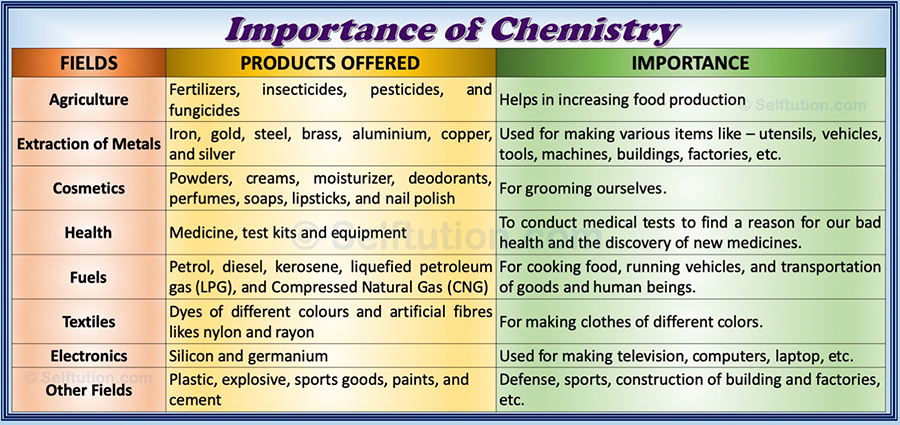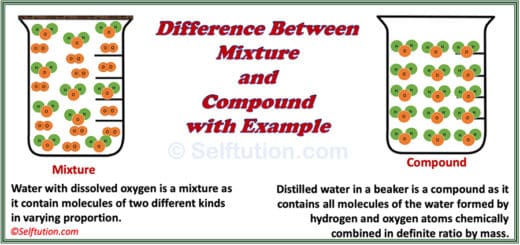IMPORTANCE OF CHEMISTRY FOR KIDS
The importance of chemistry is seen all around us, from the start of our day until we go to bed.
Chemistry helps make many of the things we use daily. It plays a key role in creating products that make our lives easier, healthier, and more enjoyable. Whether brushing your teeth or riding in a car, chemistry is at work.
Understanding the importance of chemistry can be both fun and educational. Here are some everyday examples that show the importance of chemistry:
- Toothbrush and toothpaste for brushing teeth
- Soap for bathing and a bucket for storing water
- Cosmetics like combs, powders, creams, moisturizers, perfumes, and nail polishes for grooming
- The clothes we wear
- Gas is used for cooking food
- Metals like iron, copper, brass, and steel are used for making utensils and household items
- Toys and sports items for playing
- Fuel like petrol and diesel for driving vehicles such as cars, trucks, airplanes, and trains
- Medicines for keeping us healthy
- Electronic items like televisions, refrigerators, air conditioners, mobile phones, and laptops
The list could go on and on, highlighting the importance of chemistry in our daily lives and showing how it contributes to almost everything we do!
To learn about the various types of rocks, click here
Continue>> Importance of Chemistry
MAJOR FIELDS/AREAS THAT JUSTIFY THE IMPORTANCE OF CHEMISTRY

The Importance of Chemistry in agriculture, extraction of metal, cosmetics, health, fuels, textiles, and electronics
1.0 Agriculture
Chemistry plays a crucial role in agriculture, which is vital for our food supply. As the population grows, farmers need to produce more food to meet the demand. Chemistry helps by providing:
- Fertilizers: Enhance soil fertility, allowing crops to grow better and increase yields.
- Insecticides: Protect crops from harmful insects that can destroy plants.
- Pesticides: Keep pests at bay, safeguarding crops from damage and loss.
- Fungicides: Prevent the growth of fungi that can harm crops and reduce food production.

Farmers spray chemicals to protect their crops from insects, pests, and fungi
These chemical solutions enable farmers to improve the quality and quantity of food produced, ensuring that there is enough to meet society’s needs. Thus, the importance of chemistry in agriculture is evident in its ability to help farmers grow more and better food.
2.0 Extraction of Metals
Man needs a variety of metals such as iron, gold, steel, brass, aluminum, copper, and silver for making various items like utensils, vehicles, tools, machines, buildings, factories, etc.
Metals are mined from the earth, but they are not offered in their pure form for direct use. It gives us in the form of ores. Ore is a type of rock that contains particular metals along with several other substances like clay, sand, etc. Thus, we need to extract pure metals from its ores. Chemistry helps us in this extraction. The importance of chemistry in the process could be understood by the fact, that all the steps required for carrying out extraction are developed using knowledge of chemistry.
For example, if you want to make a wire of copper, then first you have to find a copper ore and from it, you will extract pure copper for making wire. An ore of copper contains a mineral called copper sulfate. Copper sulfate dissolves in water to form an aqueous solution, which, when reacted with pure iron, forms pure copper.

The crane excavates metal ores, from which metal will be extracted using a process laid down by chemistry.
3.0 Importance of Chemistry in Cosmetics
Chemistry is fundamental to the development of cosmetics, which are essential for grooming and personal care. From powders and creams to soaps, shampoos, lipsticks, and perfumes, every cosmetic product we use is crafted through the principles of chemistry. Chemists spend years researching and observing various substances to formulate products that are safe, effective, and appealing. The importance of chemistry in cosmetics is evident, as it not only enables the creation of these products but also drives continuous innovation, improving their quality and effectiveness. Without the knowledge of chemistry, the diverse range of grooming and beauty items we enjoy today would not exist, underscoring its significance in our daily lives.

4.0 Importance of Chemistry in Medicines
The importance of medicines is well understood, as they are essential for keeping us healthy and disease-free. However, without chemistry, medicines would not exist. Chemistry is crucial in conducting medical tests to diagnose health issues and in the discovery of new treatments.

Medicines the result of Chemistry
To illustrate the importance of chemistry in medicine, consider this example:
In ancient times, patients suffered severe pain during surgery because they remained fully conscious. Today, however, surgeons use anesthesia, which allows patients to be unconscious and pain-free during operations. The discovery of anesthesia is a direct result of advancements in chemistry. This example highlights how chemistry plays a vital role in improving medical practices and patient care.
5.0 Fuels
Chemistry plays a crucial role in providing us with various types of fuels that are essential for daily life. Fuels are important because they release a large amount of energy when burned, powering everything from vehicles to household appliances. Chemistry helps in the extraction and refining of these fuels from crude oil, a complex mixture of different substances. Through chemical processes, we obtain different fuels that serve specific purposes:
- Petrol and CNG: Used in light vehicles like cars and motorcycles.
- Diesel: Powers heavy vehicles and machinery, including trucks, buses, ships, cranes, and generators.
- Kerosene: Used as fuel in airplanes.
- LPG: Commonly used for cooking food in households.
Without chemistry, the separation and production of these fuels from crude oil would not be possible.

Chemistry provides fuel for transportation
6.0 Textile
Chemistry plays a significant role in the textile industry by enabling the creation of artificial fibers like nylon and rayon, which serve as alternatives to natural fibers such as cotton and silk. These synthetic fibers offer durability, affordability, and versatility in clothing. Additionally, chemistry is essential in producing dyes that add vibrant colors to fabrics, allowing for a variety of clothing options. Without chemistry, we would be forced to wear clothes in their natural, uncolored state. Thus, the importance of chemistry is evident in the colorful and diverse range of textiles available today.

Various colors – the result of chemistry
IMPORTANCE OF CHEMISTRY IN OTHER FIELDS/AREAS
1.0 Electronics
Chemistry research has led to the development of key materials like silicon and germanium, essential for modern electronics. These elements are used to make semiconductors, which are vital for devices such as televisions, computers, and laptops. Silicon, in particular, is crucial for producing microchips and transistors that power our digital technology. Without these advancements in chemistry, the technology that drives our everyday lives would not exist. This underscores the important role of chemistry in advancing and shaping the digital world.

Electronic Circuit
2.0 Plastics
Plastic, a product of chemistry, is an incredibly versatile material with countless applications. Its adaptability allows us to create a wide range of items, including buckets, bottles, storage boxes, toys, and bags. This flexibility is due to chemistry’s ability to tailor plastic’s properties for different uses. From everyday household items to specialized equipment, plastic’s diverse applications highlight how chemistry has revolutionized material science and impacted our daily lives.

Plastic Bag
3.0 Building Materials
Basic raw materials like cement, steel, glass, and paints are essential for constructing houses, buildings, bridges, and roads, and their development is made possible through chemistry. Chemistry enables the creation and refinement of these materials, ensuring they have the necessary strength, durability, and functionality. Without chemistry, we wouldn’t have the advanced materials that support modern infrastructure, underscoring its crucial role in shaping the environments where we live and work.

Wall Paints
4.0 Sports
Chemistry provides us with materials like rubber, leather, plastics, metals, and fibers, which are essential for manufacturing sports equipment. These materials are used to create various sports goods, such as rackets, balls, nets, and skateboards. The diverse properties of these chemically engineered materials contribute to the performance and durability of sports equipment, highlighting how chemistry enhances both the quality and functionality of the gear that supports athletic activities.

Sports Items
5.0 Defense
The role of chemistry in defense is crucial, as it underpins the development of weapons like missiles, bullets, and bombs, all of which rely on explosives. These explosives are chemical compounds designed to release immense amounts of energy quickly, producing intense heat, light, and sound upon ignition. This explosive power, essential for defense applications, is a direct result of chemical processes, underscoring the importance of chemistry in ensuring the effectiveness and efficiency of defense technologies.

Atomic Explosion










